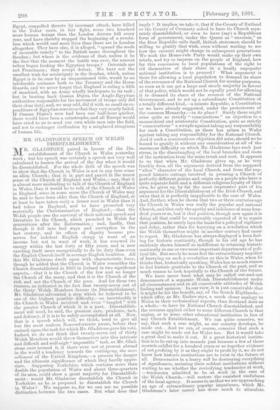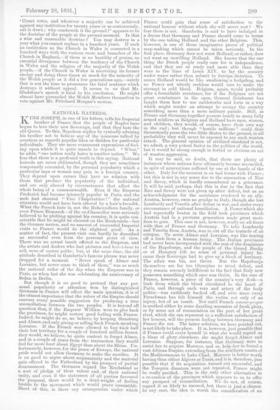MR. GLADSTONE'S SPEECH ON WELSH DISESTABLISHMENT.
MR. GLADSTONE paired in favour of the Die- establishment of the Church in Wales yesterday week ; but his speech was certainly a speech not very well calculated to hasten the arrival of the day when it would be disestablished. For the whole drift of the speech was to show that the Church in Wales is not in any true sense an alien Church ; that it is part and parcel in the truest sense of the Church of England and Wales,—nay, that it is almost more misleading to talk of the Church of England in Wales, than it would he to talk of the Church of Wales in England, since in some sense the Church of Wales may be said to have been older than the Church of England, or at least to have taken early a firmer root in Wales than it had taken in England, and to have promoted very materially the Christianisation of England ;—that the Welsh people owe the survival of their national speech and literature to the Church, which preached in Welsh for generations after the Reformation ; and, finally, that though it fell into bad ways and corruption in the last century, and its offices of dignity became pre- serves for indolent English clergy in want of an income but not in want of work, it has renewed its energy within the last forty or fifty years, and is now exerting itself more energetically to do its duty than.even the English Church itself in average English localities. All this Mr. Gladstone dwelt upon with chara,cteristie force, though he added that the Church in Wales resembles the Church disestablished in 1869 in Ireland in two significant -aspects,—that it is the Church of the few and no longer the Church of the many, and that it is the Church of the rich and not the Church of the poor. And for these two reasons, as indicated in the fact that twenty-seven out of the thirty Welsh Members favour its Disestablishment, Mr. Gladstone advocated a step which he believed to be one of the highest possible difficulty,—so inextricably is the Church in Wales involved and even " tangled " with the greater Church of which it is a part. Disestablish- ment will need, he said, the greatest care, prudence, tact, and delicacy, if it is to be safely accomplished at all. Now, that is a speech which will, we think, tend to give all but the most zealous Nonconformists pause, before they embark upon the task for which Mr. Gladstone gave his vote. Indeed, we do not think that twenty-seven out of thirty Welsh Members would throw themselves into this intricate and difficult and well-nigh " impossible " task, as Mr. Glad- stone once termed it, if there were not at present abroad in the world a tendency towards the cutting-up, the mor- cellement of the United Kingd.oni,—a process the danger and the ultimate significance of which they hardly appre- ciate. Supposing Yorkshire, which contains more than double the population of Wales and about three-quarters of its area, could show a great majority for Disestablish- ment would Mr. Gladstone disestablish the Church in Yorkshire as he is prepared to disestablish the Church in Wales ? We suppose so, for we can see no possible ,distinction between the two cases. But what does that imply ? It implies, we take it, that if the County of Rutland or the County of Cromarty asked to have its Church sepa- rately disestablished, or even to have (say) a Republican form of government, under the Queen as "suzerain," as the Boer Republic calls itself, British statesmen should be willing to gratify that wish, even without waiting to see how the current might change in subsequent generations. We wish the Home-rule Party would make up their own minds, and try to impress on the people of England, how far this concession to local populations of the right to rid themselves of their share in a locally unpopular national institution is to proceed ? What argument is there for allowing a local population to demand its share of the revenues of the National Church for secular purposes, so soon as it can get a large and steady majority in favour of that policy, which would not be equally good for allowing it to demand its share of the revenue of the National Government, and to set up a subordinate Constitution of a totally different kind,-.–a minute Republic, a Constitution as we have already suggested, under the protectorate of the common Monarchy,—in its place ? Surely there might arise quite as strictly " conscientious " an objection to a monarchical and aristocratic Constitution, quite as strictly " conscientious " a scruple against taking any responsibility for such a Constitution, as there has arisen in Wales against taking any responsibility for the National Church. And if such a conscientious objection did arise, should we be bound to gratify it without any consideration at all of the enormous difficulty on which Mr. Gladstone lays such just stress, in the disentangling of the local branches and roots of the institution from the main trunk and root. It appears to us that when Mr. Gladstone gives up, as he very frankly does, all the argument derived from the supposed " alien " character of the local Church, and from the sup- posed historic outrage involved in pressing a Church of perfectly different genius and origin on a people who have a quite separate faith and a different religious loyalty of their own, he gives up by far the most impressive part of his argument for the Disestablishment of the Irish Church, and owns that it is perfectly inapplicable to the case of Wales. And, further, when he shows that two or three centuries ago the Church in Wales was really the popular and national Church, and that only the apathy and indolence of some hun- dred years or so, lost it that position, though now again it is doing all that could be reasonably expected of it to regain that position, he surely lays the basis for a policy of vigilance and delay, rather than for hurrying on a revolution which the Welsh themselves might in another century find cause to regret. Mr. Gladstone has always displayed a keen feel- ing for historic continuity, though in his old age he has suddenly shown himself so indifferent to retaining historic continuity in one or two most important departments of poli- tical life. But surely he must feel the extraordinary impolicy of hurrying on such a revolution as this in Wales, when he thinks that, historically speaking, Wales has so much reason to feel historic gratitude to the Church of the past, and so much reason to look hopefully to the Church of the future. We have never been what may be called out-and-out denouncers of a separate Welsh Disestablishment under all circumstances and in all conceivable attitudes of Welsh feeling and opinion. In our view, it is just conceivable that it might be for the benefit, say, of the Scotch Highlands,— which offer, as Mr. Raikes says, a much closer analogy to Wales in their ecclesiastical aspects, than Scotland does as a whole,—to have its National Church disestablished, and the revenue applied either to some different Church in that region, or to some other educational institution in lieu of any Church Establishment. We can quite conceive, we say, that such a case might, as our country develops, be made out. And we can, of course, conceive that such a case might be made out for Wales too. But it would take a great deal to make it out. If a great historical institu- tion is to be cut up into morsels just because a few of these morsels exhibit for a hundred years or so together evidence of not profiting by it as they ought to profit by it, we do not know how historic institutions are to exist in the future at all. Democracies in a. hurry will be destroying everything of significance, maiming their noblest institutions without waiting to see whether the revivifying tendencies at work, —tendencies admitted to be at work in the case of the Welsh Church,—will restore the vanished usefulness of the local agency. It seems to us that we are approaching an age of extraordinary popular impatience, which Mr. Gladstone's later career has done much to stimulate. Count votes, and wherever a majority can be achieved against any institution for twenty years or so continuously, cut it down ; why eumbereth it the ground?' appears to be the doctrine of the people at the present moment. Is that a wise and reasonable doctrine ? You may destroy in a year what you cannot replace in a hundred years. If such an institution as the Church in Wales is connected in a hundred ways with the various roots and branches of the Church in England,--if there is no hostility of genius, no essential divergence between the tendency of the Church in Wales and the religion of the majority of the Welsh people,—if the Church in Wales is recovering its former energy and doing three times as much for the minority of the Welsh people as it did a few generations ago,—surely that is not the time to pronounce the fatal sentence which destroys it without appeal. It seems to us that Mr. Gladstone's speech is fatal to his conclusion. He might almost have persuaded the Welsh Members themselves to vote against Mr. Pritchard Morgan's motion.







































 Previous page
Previous page